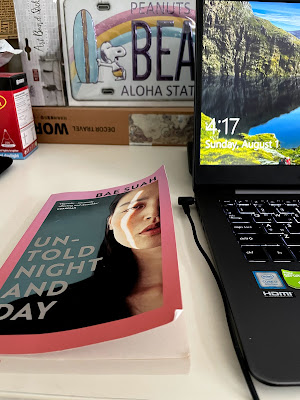 |
| Paperback Edition |
A startling and
boundary-pushing novel, Untold Night and Day tells the story of a young
woman’s journey through Seoul over the course of a night and a day. It’s
28-year-old Ayami’s final day at her box-office job in Seoul’s audio
theater. Her night is spent walking the sweltering streets of the city
with her former boss in search of Yeoni, their missing elderly friend,
and her day is spent looking after a mysterious, visiting poet. Their
conversations take in art, love, food, and the inaccessible country to
the north.
Almost immediately, in the heat of Seoul at the
height of the summer, order gives way to chaos as the edges of reality
start to fray, with Ayami becoming an unwitting escort into a
fever-dream of increasingly tangled threads, all the while images of the
characters’ overlapping realities repeat, collide, change, and reassert
themselves in this masterful work that upends the very structure of
fiction and narrative storytelling and burns itself upon the soul of the
reader.
By one of the boldest and most innovative voices in
contemporary Korean literature, and brilliantly realized in English by
International Man Booker–winning translator Deborah Smith, Bae Suah’s
hypnotic and wholly original novel asks whether more than one version of
ourselves can exist at once, demonstrating the malleable nature of
reality as we know it.
***
Title : Untold Night and Day
Author : Bae Suah
Year Published: 2020 (English Version)
Original Language : Korean
Genre : Contemporary, Fiction
Untold Night and Day is definitely like never-been-theme I ever met in Korean literature so far. It is so distinguished that I need to check several times, making sure Bae Suah is Korean. Since I lived in Korea, I tried to read many Korean Authors as I can since the book is more accessible thru online shopping, and Untold Night and Day was happened to be recommended by Coupang at that time (my favorite marketplace in Korea).
The story started from the perspective of a young actress, Ayami (See? even the name is strangely not Korean). That day is the last day she worked on a small theater run by a foundation dedicated to blind persons. The theater only has a one-time per day schedule of the show, and not many peoples watched the movie (or sound only) except for the blind and students who asked to write a review.
Ayami is an actress also the only employee, except for the director. That night, after closing the theater, she encountered a strange man that showed up in front of the door and try to talk with Ayami.
Ayami told this encounter to her strange director whilst they walking around the city, looking for her missing German teacher.
The second story is about a man named Buha. A long time ago, Buha is a businessman that frequently travels around the world, now working as a delivery man (need to check again- I forgot exactly). Buha has a dream to be a poet, not because he loves Poet or ever writes poetry, it is because he falling in love at the first sight with a poet.
Several years later, now a middle-aged man, Buha accidentally met the Poet and remembers his first love. He started to follow the Poet..even though the Poet now he meets is a young lady.
The third story is about a German writer that mistakenly is a poet. He visited Seoul, a strange peninsula where he cannot speak the language. His aim is only to finish his story.
All three stories are connected yet feels like overlapping in a different parallel timeline. It is surreal, and get more surreal that until in the end, I cannot find the answer to everything. Maybe there is no answer, maybe this is like Haruki Murakami-thingy.
What I love the most from the book is how the Author brilliantly distinguished the perspective of all three-person. It feels like written by three different authors. The character, the style, the description, the nuance, and the feeling are distinguished.
Ayami's perspective is more detailed and melancholic. She describes her surroundings in super detail and poetic. Many phrases are so well written and beautiful.
"Untroubled by clouds, the bright expanse of the evening sky spread out across the city. The entrance to the theater building was a door at street level made entirely of glass."-P12
Meanwhile, Buha's part is shorter, no detailed about the panorama, and more tactical.
I must say that this is an exciting book especially for those who love surrealism. And like I said, it caught me by surprise, since I didn't expect to read such a beautiful, pessimistic, and classics book when I picked up the 160-ish paperback.
Yes, It is interesting!
Comments
Post a Comment